
| ||
|---|---|---|
Pre-leadership Leader of the Soviet Union Political ideology Works
Legacy  | ||
Before he became a Bolshevik revolutionary and leader of the Soviet Union, Joseph Stalin was a promising poet.

| ||
|---|---|---|
Pre-leadership Leader of the Soviet Union Political ideology Works
Legacy  | ||
Before he became a Bolshevik revolutionary and leader of the Soviet Union, Joseph Stalin was a promising poet.
Like many Georgian children, Ioseb Besarionis dze Jughashvili – who would later call himself Stalin – grew up with the national epic, The Knight in the Panther's Skin . As a child, Jughashvili knew the poem by heart and passionately read the other popular poems of the time, notably those by Raphael Eristavi, Akaki Tsereteli and – once he learned Russian – Nikolay Nekrasov. [1]
At the Orthodox Seminary of Tiflis, where he was enrolled beginning in 1894, Jughashvili read Goethe and Shakespeare in translation, and could recite Walt Whitman. He also started writing Romantic poetry in Georgian. In 1895, at the age of 17, Jughashvili's work impressed the noted poet Ilia Chavchavadze, who published five of them in his journal, Iveria , attributed to the pseudonym Soselo. [1]
One of these poems, "Morning" (dedicated to Prince Raphael Eristavi [1] ), begins:
Once Jughashvili entered revolutionary politics, and became Stalin, he stopped writing poetry regularly, telling a friend it took too much time.
In 1907 he used his prestige as Soselo to obtain information from an admirer needed for a bank robbery. During the Great Purge, he edited a Russian translation of the Knight in the Panther's Skin (by a Georgian intellectual he released from prison for that purpose) and competently translated some of the couplets himself. [1]
Stalin published all of his work anonymously and never publicly acknowledged it. When Lavrentiy Beria secretly had Boris Pasternak and other noted translators prepare a Russian edition of Stalin's poems for the ruler's 70th birthday in 1949, Stalin had the project stopped. [1]
In his biography of Stalin, Simon Sebag Montefiore notes that the poems in Iveria "were widely read and much admired. They became minor Georgian classics, to be published in anthologies and memorised by schoolchildren until the 1970s (and not as part of Stalin's cult; they were usually published as 'Anonymous')." Montefiore adds that "their romantic imagery was derivative but their beauty lay in the delicacy and purity of rhyme and language". [1]
Robert Service, another Stalin biographer, describes the poems as "fairly standard for early 19th-century Romantic poetry", and as "very conventional, ... very standardized and rather self-indulgent". [2]
Stalin's poems have been translated into English by Donald Rayfield. [1]

The Knight in the Panther's Skin is a Georgian medieval epic poem, written in the 12th or 13th century by Georgia's national poet Shota Rustaveli. A definitive work of the Georgian Golden Age, the poem consists of over 1600 Rustavelian Quatrains and is considered to be a "masterpiece of the Georgian literature". Until the early 20th century, a copy of this poem was part of the dowry of every bride.

Prince Ilia Chavchavadze was a Georgian public figure, journalist, publisher, writer and poet who spearheaded the revival of Georgian nationalism during the second half of the 19th century and ensured the survival of the Georgian language, literature, and culture during the last decades of Tsarist rule. He is Georgia's "most universally revered hero" and is regarded as the "Father of the Nation."
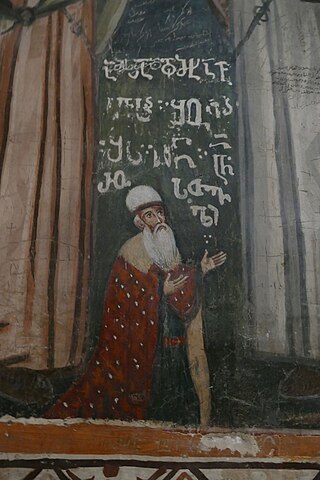
Shota Rustaveli, mononymously known simply as Rustaveli, was a medieval Georgian poet. He is considered to be the pre-eminent poet of the Georgian Golden Age and one of the greatest contributors to Georgian literature. Rustaveli was the author of The Knight in the Panther's Skin, a Georgian national epic poem.
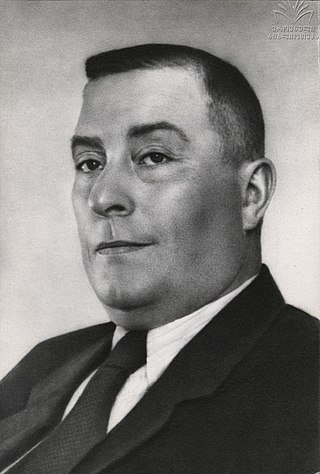
Shalva Nutsubidze was a Georgian philosopher, cultural historian, rustvelologist, literary critic, translator, public figure, one of the founders of scientific school in the field of history of Georgian philosophy, one of the founders and prorector (1920–1929) of the Tbilisi State University, Director of the Fundamental Library of the TSU, Dean of the Department of History of World Literature, Doctor of Philosophy, Professor, elected member of the Academy of Sciences of the Georgian SSR (1944), Meritorious Scientific Worker of Georgia (1961).

Ekaterine "Kato" Svanidze was the first wife of Joseph Stalin and the mother of his eldest son, Yakov Dzhugashvili.
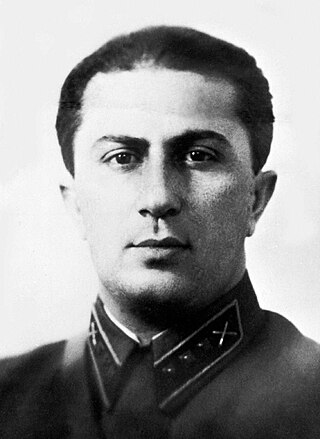
Yakov Iosifovich Dzhugashvili was the eldest son of Joseph Stalin, and the only child of Stalin's first wife, Kato Svanidze, who died nine months after his birth. His father, then a young revolutionary in his mid-20s, left the child to be raised by his late wife's family. In 1921, when Dzhugashvili had reached the age of fourteen, he was brought to Moscow, where his father had become a leading figure in the Bolshevik government, eventually becoming head of the Soviet Union. Disregarded by Stalin, Dzhugashvili was a shy, quiet child who appeared unhappy and attempted suicide several times as a youth. Married twice, Dzhugashvili had three children, two of whom reached adulthood.

Simon Jonathan Sebag Montefiore is a British historian, television presenter and author of history books and novels, including Stalin: The Court of the Red Tsar (2003), Jerusalem: The Biography (2011), The Romanovs 1613–1918 (2016), and The World: A Family History of Humanity (2022).
Kote Tsintsadze (1887–1930) was a Georgian Bolshevik who was the first chairman of Georgian Cheka and involved in the Russian Revolutions and the Sovietization of Georgia. He was purged under Joseph Stalin as a member of the Left Opposition within the Communist Party of the Soviet Union.

Simon Arshaki Ter-Petrosian, better known by his nom de guerre of Kamo, was an Old Bolshevik revolutionary and an early companion to Soviet leader Joseph Stalin.
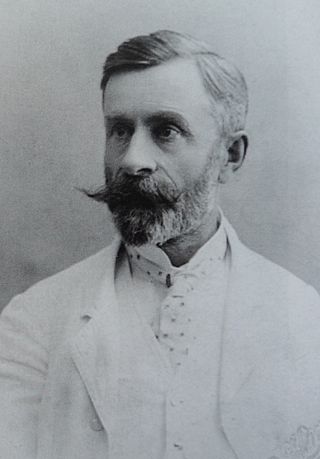
Arthur Leist was a German writer, journalist and translator of Georgian and Armenian literature.

Sergey or Sergo Kavtaradze was a Soviet politician and diplomat who briefly served as head of government in the Georgian SSR and as Deputy Prosecutor General of the Soviet Union. A Georgian Bolshevik activist, he was persecuted for his Trotskyist activities, but was pardoned and reinstated by his personal friend Joseph Stalin.

Prince Raphael Eristavi (1824-1901) was a Georgian poet and playwright.

Kandid Charkviani was a Georgian party and government official, and First Secretary of the Communist Party of Georgia from 1938 to 1952.

Alexander Semyonovich "Alyosha" Svanidze was a Georgian Old Bolshevik, politician and historian. He was a personal friend of Joseph Stalin and a brother of Stalin's first wife Kato. Nevertheless, he was arrested during the Great Purge in 1937 and he was shot in prison in 1941.

The early life of Joseph Stalin covers the period from Stalin's birth, on 18 December 1878, until the October Revolution on 7 November 1917. Born "Ioseb Besarionis dze Jughashvili" in Gori, Georgia, to a cobbler and a house cleaner, he grew up in the city and attended school there before moving to Tiflis to join the Tiflis Seminary. While a student at the seminary he embraced Marxism and became an avid follower of Vladimir Lenin, and left the seminary to become a revolutionary. After being marked by Russian secret police for his activities, he became a full-time revolutionary and was involved in a various criminal activities as a robber, gangster and arsonist. He became one of the Bolsheviks' chief operatives in the Caucasus, organizing paramilitaries, spreading propaganda, raising money through bank robberies, and kidnappings and extortion. Stalin was captured and exiled to Siberia numerous times, but often escaped. He became one of Lenin's closest associates, which helped him rise to the heights of power after the Russian Revolution. In 1913 Stalin was exiled to Siberia for the final time, and remained in exile until the February Revolution of 1917 led to the overthrow of the Russian Empire.

Joseph Stalin was the General Secretary of the Communist Party of the Soviet Union's Central Committee from 1922 until his death in 1953. In the years following Lenin's death in 1924, he rose to become the leader of the Soviet Union.

The 1907 Tiflis bank robbery, also known as the Erivansky Square expropriation, was an armed robbery on 26 June 1907[a] in the city of Tiflis in the Tiflis Governorate in the Caucasus Viceroyalty of the Russian Empire. A Bolshevik group "expropriated" a bank cash shipment to fund their revolutionary activities. The robbers attacked a bank stagecoach, and the surrounding police and soldiers, using bombs and guns while the stagecoach was transporting money through Erivansky Square between the post office and the Tiflis branch of the State Bank of the Russian Empire. The attack killed forty people and injured fifty others, according to official archive documents. The robbers escaped with 241,000 rubles.

Ekaterine "Keke" Giorgis asuli Geladze was the mother of Joseph Stalin.
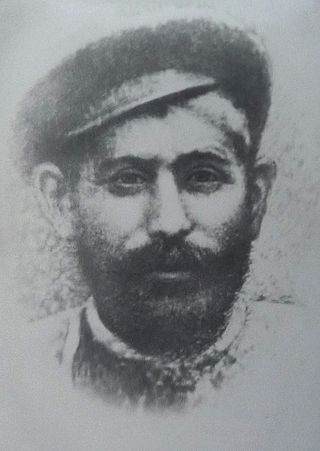
Besarion Ivanes dze Jughashvili was the father of Joseph Stalin. Born into a peasant family of serfs in Didi Lilo in Georgia, he moved to Tbilisi at a young age to be a shoemaker, working in a factory. He was invited to set up his own shop in Gori, where he met and married Ekaterine Geladze, with whom he had three sons; only the youngest, Ioseb, lived. Once known as a "clever and proud" man, Jughashvili's shop failed and he developed a serious drinking problem, wherefore he left his family and moved back to Tbilisi in 1884, working in a factory again. He had little contact with either his wife or son after that point, and little is known of his life from then on, except that he died in 1909 of cirrhosis.
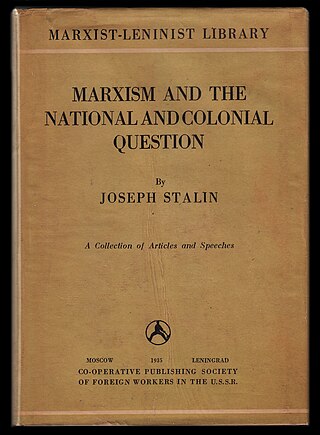
Marxism and the National Question is a short work of Marxist theory written by Joseph Stalin in January 1913 while living in Vienna. First published as a pamphlet and frequently reprinted, the essay by the ethnic Georgian Stalin was regarded as a seminal contribution to Marxist analysis of the nature of nationality and helped to establish his reputation as an expert on the topic. Stalin would later become the first People's Commissar of Nationalities following the victory of the Bolshevik Party in the October Revolution of 1917.